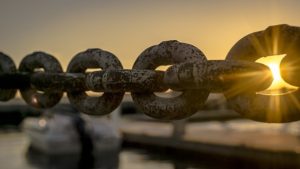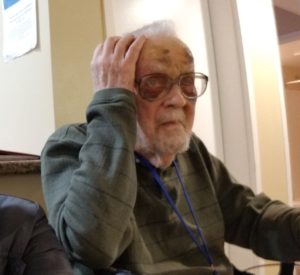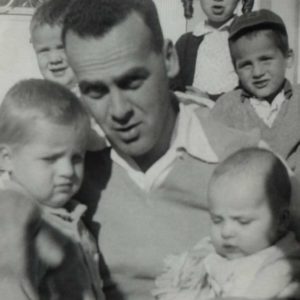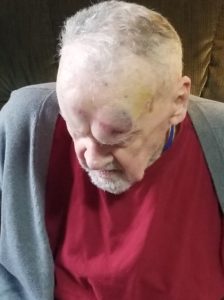
THE CHAIN OF BEING
Let me tell you how I best understand the fundamental links of being. These four variables together comprise something I call the emotional being chain. It is these four factors which operate mostly unknown, influencing everything, especially how we think and interact with each other and the world.
Contrary to what most people believe, we exist emotionally and then use our brain (usually the left brain in right handed people) to rationalize things later. We tell ourselves a story of why. We are far more deterministic than religions bent on “free will” allow.
Emotions occur faster than the brain can think for good reason: If a threat is present, we don’t have time to weigh the pros and cons of a situation. Instead, we’ll use our fight or flight system to prepare to either escape or resolve the danger immediately. OK, basic enough.
Out and about, most of us exist in a mild fight or flight state most of the time. We stay at the ready.
The human brain is a prediction machine. It uses the body’s needs, and prior emotional experience to make sense of the circumstances in the environment. Everything we do, our perceptions, our actions and our learning is based on making and updating expectations.
In fact, all our disappointments are driven by our expectations.
Even sight is based on predictions and expectations.
What you see comes in through the eye and hits the visual cortex at the back of the head. Most of the signaling goes from the eyes to the vision center there.
But, some neurons go the other way, coming from higher levels of the brain (the cerebral cortex) down to the visual cortex. These are thought to carry predictions. If you have seen it before, you are likely to see it again.
If you can’t identify something, your brain will fill in the blank from memory until you see a more accurate picture. This is helpful remembering a route home, but also allows us to see images in clouds on a summer’s day.
The brain uses interoception to gauge the body. That means it checks what’s going on with you physically through its special sensors. It does this primarily through the tenth cranial nerve, the vagus system, which is connected to the heart, gut and organs. It uses exteroception to gauge where you are in a space, giving you an awareness of your surroundings and your place in it.
For example, 100,000 neurons line your gut, another 40,000 exist in the heart. More than 80% of vagus neurons are afferent, meaning they signal towards the brain. These give the brain a constant update of what is going on physiologically. The brain is not just in your head but rather, reaches most of the body.
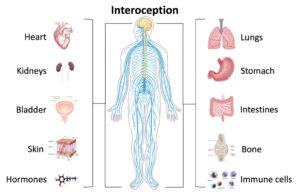
From this, you get two general emotional states: valence and arousal. Valence is simply comfortable or uncomfortable. Arousal is either on or off, alert and agitated or resting.
Feelings are predictive, not reactive. Long before we become aware of feelings we have, they have already taken hold of our body’s system. The brain is constantly trying to predict what will happen next to prepare you for circumstances.
You probably remember overreacting to something on incomplete information. We all do it, it’s a natural part of what it is to be human. It’s only as things unfold can we tell if our reaction was appropriate or not.
We are constantly adjusting. The better we understand this, the easier it is.
Feelings are predictive responses to the body’s needs based on prior emotional experience, then tested against the social reality before you—after the fact—and corrected.
We learn feelings first as babies, and these become increasingly complex as we are exposed to new experiences.
Contrary to the idea we all possess the same emotions, it is more that we experience many of the same things which produces a similar storehouse of emotional responses. There is no strict set of emotions shared by all.
Every experience you have as a young child onward contributes to your bank of feeling states. These are called upon predictively (mostly below awareness), allowing you to face whatever situation is in front of you.
It’s a best-guess system, corrected after the fact.
Even as you read these sentences, you are trying to predict where I’m going with this. In conversations with friends, you are doing the same; that is, trying to guess what they will say next. You’ve caught yourself finishing other people’s sentences more than once. Others have done the same with you.
Prediction is why when you first gaze upon a scene, you may see things you know from memory before seeing what is actually before you. That’s the brains prediction system at work!
In any given moment, your brain is using its vast storehouse of recalled emotional experience to determine the future and the best state to keep you safe. You are also using the same basic mechanism to predict and understand the people around you.
We sometimes jump to conclusions based on beneath the surface feelings about something. Other times, we under-react because our experience doesn’t signal the current situation as a threat or familiar.
No two people’s emotions are quite the same, simply because no two persons have lived in the same way. In the case of anxiety or anger, you may now understand how prediction is the real cause of our discontent and pain.
You can imagine all this brings great advantages. Recording old emotions and feelings in the body for future use is a handy evolutionary adaptation. Having feelings directly connected to your sympathetic system means fear can safeguard your life.
The sequence is this: Physiology (body) to emotional state (valence and arousal) leading to predictive feelings (based on old experience) and finally, thoughts. This is the chain of being.
Think of thoughts as an “explanation” for what’s going on with the body.
This is why we adjust after-the-fact. The body is way ahead of us, and thoughts come last in the chain of being. Where do we feel fear the most? In the body. Follow me so far?
Ever come home after a long day and snap at someone? Only to realize later you hadn’t eaten since that morning? That’s an example of interoception leading the way. It can be good to stop and ask, “what’s my body telling me?”
And, by understanding feelings as imperfect guesses based on old experiences, we can take responsibility for them by countering their effects and perhaps, letting them go. Maybe you just needed to eat something or look after your body with sleep, water, etc. Learning to recognize signals from the body is key to personal mastery.
What’s the best way to create new feelings? Create new experiences.
Doing new things gives you new feelings to store away for later. This is how we break old fear pattern by implementing new strategies.
Doing this gives you a deeper repertoire of scenes and emotional data points—which your brain will automatically employ and test against the ongoing reality before you. That’s also what maturity is about: Life gets better as we get better at life…
It’s worth repeating: all our disappointments are driven by expectations. Not only is this true, everything else about how your body and mind deals with the world is also driven by expectations. Changing expectations is going to the source of things.
To consciously change your state at any given moment, you can change what you think or change what you do.
DOING AND THINKING
The chain of being: Physiology, emotional state, predictive feelings, thoughts.
That’s your approach to life, factoring in your consciousness. Here’s something else: You can intervene at each end of this chain to tackle anything. You can change the body, thoughts, or both.
Focus and Language: two special forces bridging the chain of being
We simply cannot take in all the information around us and record it. Nor can we mentally attend to but a tiny fraction of the stimuli in our environment. The brain is amazing, but it has its limits.
Imagine looking around you with a large magnifier and only seeing through its lens. You would see some things straight ahead clearly up close, the rest of it at the sides would be blurry and faded. That’s what your brain’s ability to focus is like.
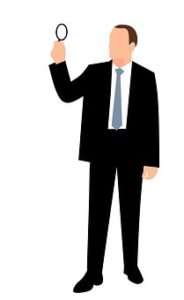

Focus is both mental and physical. You use your eyes to focus, and you turn your body towards what engages you in the environment. And, pictures from what you see engage your mind physically at the visual cortex. The rest of your senses operate on focus as well, as you touch, smell, strain your ears to hear, or when you taste something.
What you are telling yourself, your self-talk, your thoughts, can be brought under your free-will ability to control through focus. So is your imagination. Otherwise, self-talk is under at the mercy of the subconscious.
It can also be either/or. You can stare at something new and for a moment, register no thoughts. In these instances, you can almost feel your brain trolling through its databank trying to make sense of the scene. Other times, you can stare into the distance and see nothing, while vividly day-dreaming about something unrelated.
Where you decide to focus works at both ends of the being chain. You can use focus to take control of fear by determining what your body will do and thereby, what thoughts come to mind.
Language: a bit of both worlds.
If you were born wild without language, it is thought that you would soon develop one to communicate with those around you. Like focus, language has both thinking and doing aspects to it. It straddles the distance between the two ends of the chain of being.
You speak a language, in which case it’s a physiological thing. Add to this you can whisper, and you can scream, you can also sing, and you can whistle. There’s a remote village in Italy where some of the old-timers whistle to each other to communicate. To THEM, whistling is a language in itself—no words, all physiology.
You will often think in images, impressions, even feelings, and taken together, you might express these with the use of language in thought. “I told myself…,” we say to others as we explain ourselves. “What I was thinking was…,” is another. And all of our rationalizing, the story we tell ourselves after the fact to explain why we have acted, felt, or thought something, is usually expressed in language.
While what you do and what you think are the main doors to your chain of being, both focus and language play special roles.
Focus means you cannot remember much of your past. You can only recall a tiny part of your history depending on its significance and emotional intensity. This tells us putting full stock in a remembered past is a mistake. It might be necessary, but is rather weak grounds for making conclusions about the present.
That’s not to discount or dismiss the past entirely. After all, part of the richness of your life and most important lessons resulted from what you remember. It’s likely there was both pain and pleasure derived from your history, and these experiences added to the fullness of life.
But it’s important to realize the remembered past is a faulty record, and therefore, accord it the skepticism it deserves. Studies show just talking about our past experiences changes what we remember, something called re-consolidation. It’s said every time we revisit a memory, we put it away just slightly changed. We put a different spin on it as we reconcile the past through today’s eyes and viewpoint.
Again, it’s the power of focus, a great deal of which is not under conscious control as the chain of being rules.
A similar case can be made for language. When I was learning to write, my father used to tell me how important it was to get the wording just right. In fact, this is one of the best challenges of writing, or communication in general. Getting it right when we describe our situation or thoughts to others is far more effective when we find the exact words to express what we are trying to say.
And so, it goes with our thinking. If I tell myself “I always get nervous meeting new people,” chances are I always will. If I tell myself I can’t, what I am really saying is that I won’t. If I mention I am “outraged” when the word “concerned” would have done just as well, I pay for it physically in higher emotional arousal. Inflammatory words cascade through the chain of being and cost me, exaggerating their physiological effects in the end.
Talk angry and the body is angry too, even destructive. Speak fearfully and the body cowers from life, afraid, protective, tentative, hesitant and weaker than needed.
The body is where you live. Living in the present is the only way to live life effectively. The past is but a distant memory.
Sure, keep an eye on the future but spend most of your energy in the present—where the real action takes place. It’s all any of us can control anyway, right?
Similarly, you can tackle the chain of being at the thinking end to reframe things, thereby providing answers which create better feelings and a more relaxed emotional state.
Letting go of ill-will towards someone or something often results in a noticeable relaxation of the body’s musculature or internal process. It can stop our guts from flipping. It can make a headache go away.

I have two ruptured disks. I’m in pain every day. Yet, medicine knows of others who have the same two ruptured disks and have very little pain. The differences between the two might be found in my chain of being.
I know if I carry anger towards someone, my back will hurt more than usual. I had to learn this over the years. Now, I’m very careful to not carry ill-will or I suffer the consequences. Anxiety or overworking to deadlines do the same thing. Part of my self-care is to not make things worse by triggering the chain of being with shitty thinking.
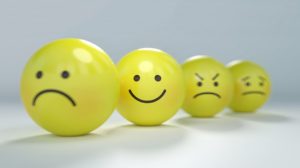
Another cool example of the chain if being is smiling. Even better, smile facing a mirror. The brain will sense your smile and release hormones to match the body’s condition. Suddenly, mood elevates. Every time you brush your teeth, smile at yourself in the mirror to finish, hijacking the chain of being in your favour.
I used to bridle my door-to-door reps’ mouths with a pen. Having a bad day? Sit in the truck with a pen across your mouth, forcing your face into a smile for 10-15 minutes. Sure enough, when I put them back out to work, they’d start selling again. I’ve done this successfully too many times to question its merits as an intervention.
Anyone in a full-blown panic attack can kill the pain of anxiety in ten minutes by going for a jog. There’s something about putting one foot in front of the other while staying upright at speed which negates the future-focused thinking characteristic of anxiety. Soon, the body takes control and releases the tensions held by thought.

I tell you all this because we often forget the body. Instead, because we tend to think in language, or in pictures and music, we focus only on our thoughts and convince ourselves this is where we should put the most stock.
But when you consider the chain of being, it’s plain to see the natural order of things starts at the body and ends with thoughts. When people experience trauma, there is a disconnect in the chain of being. Heart rate variability will lessen, and the body-tension may hold indefinitely. Unexpressed defensive postures that would have been usually employed at the time of trauma may instead be internalized in the body and cause problems later. This is why activities like yoga are so effective in this case: the breathing and body awareness allow for a re-connection of interoception pathways, identifying, lessening and releasing triggers to trauma.
The chain of being is why I put the body first when I consider areas of my life. It’s body, spirit, people and work. It all begins with the body. Routine habits like good posture while sitting or walking, or activities like dancing, can elevate your emotional state and provide immediate benefits.

You may think you live at some street or avenue or town somewhere. While this is true as a place where you rest, put your stuff and get your mail, it doesn’t give the real picture about where you live.
The universal address of your existence is in your body.
Go rattle that chain…
Stay powerful, never give up
©2018 Christopher K Wallace
Advisor to Men
all rights reserved
Facebook
advisortomen

